
So Andrew’s matric result predictions were both spot on! While analysis and discussion on the second point will follow next week, today we’re celebrating the first: that ikamvanites will once again excel 🙂
Ikamvanites have shown, once again, that transformation is possible, despite the odds. The great news is that 78% of the class of 2010 is eligible to move from township schools to tertiary institutions next year!
It has been a difficult year for matrics across the country, with much of the school year lost to the World Cup and public sector strikes, and learners in township schools have been hit especially hard. Yet ikamvanites achieved an 87% pass rate, with 52% Bachelor passes and 38% diploma passes. 36 distinctions were awarded. We’re producing results comparable to the country’s top (and highly resourced) schools in our mission to redress inequality in South Africa: Well done to everyone who’s ensured that our matric pass rate has been between 87 and 100% since 2005!
Each branch has achieved excellent results:
- 85% pass in Western Cape (of whom 48% achieved bachelor and 39% diploma)
- 85% in KZN (of whom 50% achieved bachelor and 45% diploma), and
- 94% in Gauteng (of whom 63% bachelor and 25% diploma).
Of those learners that failed 70% are eligible to write supplementary exams, and we need all hands on deck to ensure they get the support they need.
While we are very proud of our learners and these achievements, the real measure of IkamvaYouth’s success is our ability to help learners access post-school opportunities. Achieving these results is a first big step, yet many obstacles need to be overcome in the next few weeks, including actually being accepted, finding money for registration fees and navigating the bureaucracy of institutions and financial aid. Some of our learners have already received confirmation of university placements and scholarships, but there is work to be done to meet our target of at least 60% enrolling at tertiary with the remainder securing learnerships or employment.
The young social entrepreneurs (i.e. the rockstars Khona, Joe & Andrew, Winile, Nombu, Nico& Zoe&Sue) that run IkamvaYouth’s branches have successfully leveraged the power of volunteerism and strategic partnerships (with local universities, public libraries, NGOs, companies and foundations) to replicate the IkamvaYouth model. Together with their awesome volunteers, they ensure that learners receive the information and support they need to succeed despite the challenges of township school education. These results are possible thanks to the learners’ and volunteers’ hard work and the rallied support of diverse stakeholders. The fully sponsored Answer Series Study Guides were no doubt a big boost in assisting our learners. IkamvaYouth garnered support from the Western Cape Education Department (WCED) last year, and hopes to partner with other Education Departments in 2011.
Many learners jumped 2-3 symbols since joining the organisation, and there have been excellent individual results. Brighton Dube, a Gauteng ikamvanite, received five distinctions. Simphiwe Ndzube, a committed Ikamvanite at the Masiphumelele branch achieved 94% in visual art and has been accepted at UCT’s Michaelis Art School. He says “What made me focus; I had a dream, a goal to get into university, which motivated me to work hard, study every day, and I was aided by the supported from my family, friends, teachers and IkamvaYouth mentors. Wow, I did well! UCT here I come! I am proud of myself!” Thabisile Cele, an ikamvanite in KZN, had to overcome the challenge of her parents not understanding why she studied late into the night. Her parents were often unhappy with her “wasting electricity” while studying at night (her father is disabled and unemployed). Encouraged by her sister (a former ikamvanite) not to give up, Thabisile saved up some money and bought candles. Her family is celebrating her Bachelor’s pass and acceptance to study Environmental Studies at the University of KwaZulu Natal (UKZN).
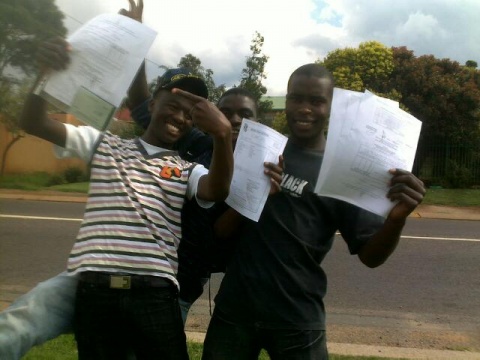
Matthew Mlahleki celebrates his 5Bs and 3Cs with tutors Fulufelo Tshigomana and Clement Shai at IY Gauteng
“We are thrilled that the class of 2010 has achieved the results to make this change happen for themselves and for others”, says IkamvaYouth KZN director Khona Dlamini. Winile Mabhoko, the Khayelitsha branch coordinator, expects that most of these matriculants will return as volunteer tutors and mentors, as has happened in previous years. Class of 2010: Please pay-it-forward and register as IY tutors!
We’re welcoming new learners in grades 8-11 into its programmes. Interested learners, parents and volunteers should make their way to their nearest branch on 22 January for IkamvaYouth’s Open Day, to find out how to become an ikamvanite.

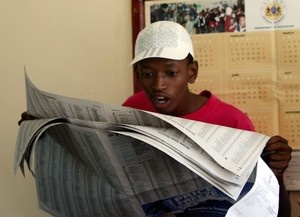
Right now there are many hundreds of thousands of ex-matriculants anxiously waiting for their Matric results to come out on Thursday 6 January 2011.
With this in mind, I’d like to stick my neck out a bit and make two predictions for the 2010 Matric results.
- My first prediction (and one I make with a reasonable degree of confidence) is that Ikamvanites will once again excel despite the incredible obstacles they encounter in their schooling careers. The MEC for Education in Gauteng, Barbara Creecy, recently indicated that our township schools cover an average of only 60% of the curriculum each year which has a devastating compounding effect each year a learner progresses. (click here for her talk). Despite this, the IkamvaYouth Matric group will once again be an inspiring example of a group of individuals taking their futures into their hands though hard work, collaboration, dedication and commitment. As a result, many more township school learners will access quality post-school opportunities and many more will return to IkamvaYouth as volunteers to help others do the same.
- The second prediction (and this is more a hunch) is that the overall matric pass-rates will stay the same or close to the same as 2009 – and may even improve by a couple percentage points. Now if you’ve been following the traumatic schooling year that was 2010 you’d probably think this would be a somewhat surprising (read: miraculous) result. If this is indeed correct, then it would seem that the schools have achieved phenomenally well despite the massive disruptions of a 5-week public servant’s strike and the extended holidays for the Soccer World Cup. Or at least thats one interpretation. The other interpretation (and I’ll leave it to you to decide which one is a truer reflection) is that we will now have conclusive proof that you can take teachers out of the classroom for 5 full weeks and add additional disruptions and not see any major negative impact on the end results. If this does not prove how dysfunctional our schooling system really is then nothing will. It is somewhat perverse to think that it would actually be more reassuring if there was a significant drop in 2010’s Matric results but I don’t think we’re going to see it.
We’ll know for sure next week whether any of these predictions are accurate and then we’ll no doubt be inundated by analysis from the experts who may agree or disagree with the above but the bottom line (in my opinion) is that we continue to shuffle deck-chairs why the titanic is sinking.
.
As IkamvaYouth we’ll no doubt put together an official response to the Matric Results and try to identify areas where we – as a country – can begin to solve this problem. On the one hand we will wildly celebrate the SUCCESS of our amazing Ikamvanites while at the same time, on the other hand, we will continue to be moved by the annual loss of learners who leave school with limited future prospects.
.
Andrew (in his own capacity)
Want to make a difference or help us expand? Then sponsor a learner or IkamvaYouth branch today? Or Volunteer.

Hi everyone,
I am writing on behalf of all the ikamvanites to say a huge THANK YOU to all our learners, volunteers, interns, families, collaborators, supporters and friends; to wish you all HAPPY HOLIDAYS and to share some of our highlights and stories of 2010.
The year started with much cause for celebration: Our two grade 12 cohorts from the class of 2009 achieved excellent results. The Western Cape learners achieved a 89.7% matric pass, while the KZN learners achieved an 82% pass; compared with the national pass rate of 60.6% and provincial passes of 78.6% and 66.1% respectively. Even more impressively, 86% of the Western Cape ikamvanites and 81% of the KZN ikamvanites achieved Bachelor or Diploma passes, enabling access to university and universities of technology. This is particularly notable given that only 34.9% of black South African youth achieved these types of quality passes in 2008 (CHET, 2009). More than 70% of last year’s grade 12s are currently enrolled in tertiary institutions, and many have returned as volunteer tutors and mentors.
We’re hoping that the class of 2010 will reach similar heights, despite the disruptive school year caused by the World Cup and the strikes. IkamvaYouth’s branches stepped up to offer intensive tutoring, holiday programmes and strike-interventions this year, and the results of our volunteers and learners’ hard work is already evident in the reports that have been coming in over the last few weeks. There are so many great stories, activities, projects and achievements that it’s impossible to mention them all here. Please browse through our blog, join us on facebook and follow us on twitter to get a sense of some of what’s been happening this year at our branches in Khayelitsha, Nyanga, Masiphumelele, Cato Manor and Ivory Park.
We thank the supporters and partners who made these events happen, particularly the campuses that availed pro bono access to their venues and infrastructure for weekly activities (Nazeema Isaacs Library, Masiphumelele Library, Nyanga Library & Siyakhula Community Centre) and winter schools (TSiBA, UWC , DUT). A huge thanks is due to the committed donors who funded our activities again this year (Raimondo Trust, EMpower, The Learning Trust , Amobia, Hatch, Transnet & PPF), and a great thanks and welcome to the new funders who joined us this year (Potter foundation, Anglo American Chairman’s Fund, AME, Starbucks, Masi Corp, Eskom, Apheda, Nashua & WCED). Thanks especially to the individuals who’ve donated throughout the year through our fundraising events and monthly direct deposits.
We’re very proud to have launched the coolest website on the Internet, and send out a huge shout of thanks to the volunteers who designed and developed it :). We’re also super excited about the upcoming ikamvanite zone site, where ikamvanites can share resources, how-tos and networks for implementing IY programmes at their branches and beyond… watch out for the launch early next year.
Phillip Mcelu, Funeka Kalawe and I presented the IkamvaYouth model at the Quest conference on Improving Student Achievement and 21st Century Skills in Canada, and a major highlight of 2010 was receiving the Mail & Guardian / Southern African Trust Drivers of Change award for being THE civil society drivers of change in Southern Africa! The judges said of the ikamvanites “these learners are the true drivers of change as they are also setting a good example for younger learners to become agents of change for their own success.” Please read the full article about IkamvaYouth in the M&G’s Investing in the Future suppplement.
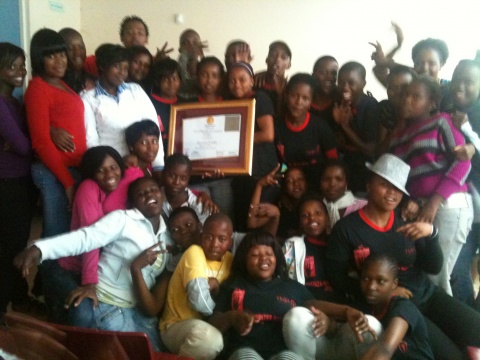
Finally, we welcome and congratulate the newest addition to our board of directors, Thobela Bixa. Thobela was a grade 12 ikamvanite in 2005, and has recently been awarded the Potter fellowship to do his MA in Chemistry at UCT. He’ll also be joining Susie at the University of Michigan for a year 🙂 We thank David and Elaine Potter for their ongoing suport of our people and organisation.
While we celebrate the achievements of our learners and volunteers, the situation we seek to address is depressingly becoming worse. While in 2002, white learners were twice as likely to enrol in tertiary study than their black counterparts, in 2007 this disparity increased such that white learners were three and a half times as likely to enter the doors of higher learning than black learners (CHET, 2009). The pressure is therefore upon us to do more, and in order to step up to meet this need, we need your help.
If each of the people reading this volunteers 3 hours a month or donates your equivalent earnings for this time, we can make a significant dent in the inequality that’s perpetuating disadvantage in SA.
600 learners will be enrolled in IY programmes next year, and we need funding to provide them with the support they need to lift themselves and each other out of poverty. With more volunteers and funds, we can reach more learners in the coming years – join the learning revolution and be the change! Volunteer! Donate! … or at least get a My School Card!
We’re holding thumbs for our 2010 matric’s results, and look forward to all the successes and challenges of 2011. But in the interim, let’s all enjoy the holidays 🙂
Viva ikamvanites, viva! Thanks for a truly remarkable and wonderful 2010.
Joy

While the education sector has been through some challenging times this year – especially the public sector strike that had a tremendous impact on the schooling system especially those schools in the townships, there has been many more satisfying accomplishments for IkamvaYouth along the way. During these trying times, IkamvaYouth took charge by helping our learners with more tutorial sessions during the week and on weekends which culminated to better academic results that a mojority of our learners have attained this year and of course we are very optimistic that our matriculants will do the same. All of this has been a testament to dedication and commitment of our goals. At the end of it all, one cannot forget but to mention the successfull and a well attended Prize giving ceremony hosted jointly by the Makhaza and Nyanga Branch on the 3rd December 2010. This event recognises the commitment and dedication of both our learners for achieving the best attendance for the year as well our tutors for freely and willingly giving their time, skills and talent to help us realise our goals. While the beneficiaries (i.e. leaners) were thrilled by receing the awards and of course the gifts that accomponied the certificates, one cannot forget to extend a word gratitude to people who made it all possible (our sponsors: Fedics who donated food and Appletiser who donated drinks, UCT Centre for Film and Media Studies who donated Nokia phones and a special thanks to Raimondo Trust for sponsiring our excursions, and many more who sponsored us with money, books, diaries etc)
To all our sponsors, IkamavaYouth is making an impact to our society because of your generosity and for that we are greatfull. Your donations makes it possible to continue making change in education despite the challenges we face everyday and of course the economic distress that we sometimes find ourselves.We look forward to working with you in the future.
To all our volunteers at large, IkamvaYouth and those we serve, deeply appreciate your contribution and thank you for making 2010 a year to remember.
Enyoy the festive season and all the goodness that it brings!
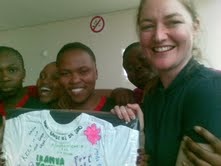

The following is an outline of the successes and obstacles experienced over the course of the four months that we spent working with 11th grade learners at IkamvaYouth-Makhaza Branch. First, it is important to note that we (my project partner Jonathan Wang, the learners, and myself) set out to accomplish a set of tasks that were unique, demanding, both technically and intellectually, and progressive from an educational perspective—such an approach is representative of IkamvaYouth as a whole, be that as organization, an idea, or as a group of wonderful people. As a result, we were bound to have a certain degree of success with our project no matter the obstacles we faced.
Our approach to the project was multifaceted and as such, sought multiple outcomes and objectives. Generally speaking, the focus of the project was to work with Ikamva learners in the testing of flexible, low-cost, open-source mapping techniques, which included hand-held GPS devices, digital cameras, and www.openstreetmap.org, to produce detailed street-level maps of areas around Khayelitsha—namely the shops along Landsdowne Road at R310 and Zwelitsha. More importantly, the focus of the project was to introduce learners to discussions of maps and their uses along with lessons on photographic techniques in order to get students to engage critically with their spatial environments—to begin to think about their neighborhoods as a network of roads and buildings that had relationships with one another, often mediated by concepts such as formality and informality. We also wanted to use the project as a way to introduce new technologies and software, such as Google Earth and Photosynth, to learners to try to provide them with a sense of how cutting-edge technologies are shaping the world. In doing so, we hoped that learners would have their minds opened, if only slightly, to the limitless possibilities that computers and science present us in the modern age.
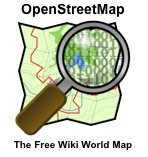
The first objective represents my research as a Visiting Scholar at the University of Cape Town. I am working with the Cape Urban Observatory Project to design and develop mapping techniques capable of efficiently and effectively mapping informal communities. Along with the project in Makhaza, I am working to map areas of Delft as well.
One of the main reasons we reached out to Ikamva to collaborate on this project was the fact that Ikamva learners come from the kinds of neighborhoods that our work seeks to explore. A central object of our work is to further the ends of community-based, participatory mapping as a means to promote community-driven development. As such, it was of great interest to us to try to involve learners in the scientific processes that produces authoritative information about the communities they live in. In terms of getting access to the areas to map and of getting learners involved in doing the actual mapping, we were quite successful. We were able to conduct the kind of tests we needed with equipment we had, and to this end, S’bu and Sinethemba (two of Makhaza Branch’s most dedicated tutors) were absolutely essential. They helped Jonathan and I navigate the neighborhoods of Khayelitsha, as well as capture the attention and imagination of the learners. Needless to say, I learned a great deal from the both of them about life in South Africa, life in the townships, and about the desire to overcome the obstacles to education that are presented a person as a result. For my education on these topics I am certainly indebted.
In terms of engaging with students, which represents the sort of second and third objectives to the project, I think we were pretty successful. Students were certainly interested in the digital cameras and immediately we saw them as a means to incentivize the actual work part of the mapping. We were able to design a couple of lessons that allowed learners to take the cameras home with them and use them to capture imagery of their neighborhoods to help with the map. They were all certainly keen because this also meant that they could use them to take pictures of their friends and families. We were able to project the imagery they took of their neighborhoods to discuss mapping and composition techniques, as well as concepts of mapping as a scientific approach, before going to do our field work. These in class exercises helped students stay engaged with the project material when they weren’t using the cameras or GPS devices in the field. We were also able to provide learners with DvD’s with their pictures and this gave learners a direct by-in to the project above the actual work itself.
Once in the field, things were always a little more challenging because as researchers we have to come in contact with the real world and doing so in Khayelitsha can be particularly difficult. This is where the majority of our obstacles occured. Language and cultural barriers alone between us as project leaders, the learners, and the community writ large presented certain obstacles to communication at times.
A second sort of related issue was the conspicuousness of the cameras while doing field work. They were often a source of confusion for residents of the community because many assumed us to be taking pictures of them to sell. Though we were able to explain to most people what we were doing, an improvement on this project would be to use GPS enabled cell phones that have a camera. That way we could collect image and GPS data while appearing less invasive to the community.
Over the next few months my project partner and I will be developing OpenSettlements.org which will be home to the maps and data we produced here while working at IkamvaYouth. We hope to explore the possibility of a map-based multimedia project using GPS enabled phones sometime next year, so that future learners can add to and build on the base-map data that the 11th graders helped create.
Ryan Bosworth
Visiting Scholar, University of Cape Town











 Lloyd Lungu
Lloyd Lungu